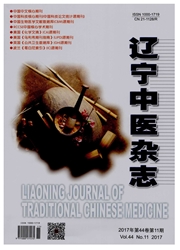

 中文摘要:
中文摘要:
目的:对肝气郁结型亚健康状态干预效果的四诊客观化评价。方法:选择肝气郁结型亚健康状态人群为研究对象,分为实验组和对照组,使用四诊合参辅助诊疗系统采集四诊信息,并运用中医养生气功八段锦对其进行3个月的干预,干预后再次采集信息,并评价干预效果。结果:按照评分标准计算,干预前后症状改善明显(P〈0.05),与对照组相比同样也有显著差异(P〈0.05);脉诊指下感觉柔和,趋于平变,脉图也趋于平变。结论:四诊客观化评价可以应用于亚健康干预研究中,以此为基础,根据各型亚健康状态的特点,进一步制定和规范干预方法和检测手段,为大范围的推广奠定基础。
 英文摘要:
英文摘要:
Objective:To evaluate the intervene effect of sub-health of qi stagnation syndrome by objective TCM Four Diagnosis.Methods:Sub-health of qi stagnation syndrome subjects were selected in the study.The TCM-FDAA was used for the collection of four diagnostic data of the divided experimental and control groups.The data was collected again after three-month intervention of Qigong Baduanjin by the TCM-FDAA to evaluate the intervention effects.Results:According to the rating standard,the symptom improvement was obvious after intervention(P0.01).Compared with the control group,the symptom improvement was also with significant difference(P0.01).The pulse was soft.The pulse graphics was also smooth.Conclusion:According to characteristics of various types of sub-health state,the intervention and detection methods are developed.It provides theoretical basis for the promotion of TCM-FDAA in a wide range application.
 同期刊论文项目
同期刊论文项目
 同项目期刊论文
同项目期刊论文
 期刊信息
期刊信息
